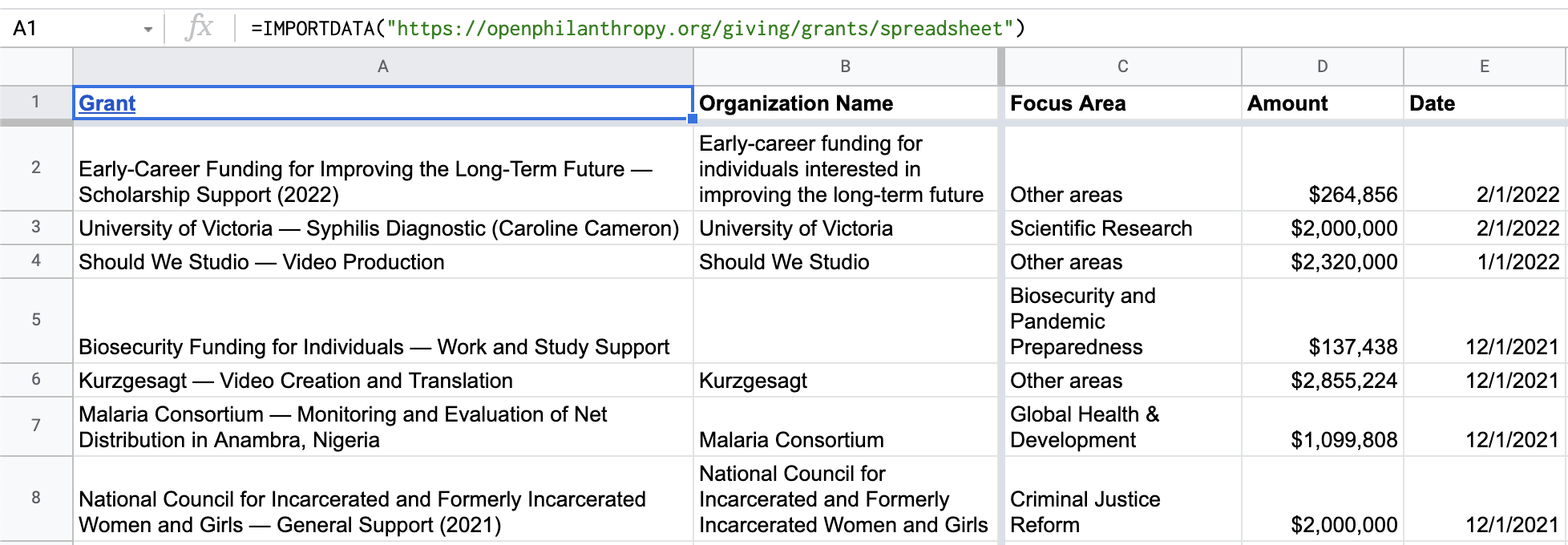Open Philanthropy, Survival and Flourishing Fund, EA Funds and several other "EA-aligned" grantmakers publish most/all of their grants. But they're kind of hard to search, and it would take a lot of work to assemble a complete picture of all the publicly-available grantmaking that EA Forum users might care about the most. Has anyone done anything like this? I think it would be pretty interesting (and maybe useful!) to have a spreadsheet which automatically pulled in all grants from the top funders we care about.
Hide table of contents
33
0
0
Reactions
0
0
New Answer
New Comment
4 Answers sorted by
[Just to be clear, this was silly of me]
Ok so I made a sheet that will automatically update with OpenPhil and SurvivalAndFlurishing's grants:


Technicalities:
- Each got it's own tab, but I can combine them
- The link gives edit access. This isn't a serious project, I don't mind if it's ruined
- I couldn't figure out the ea.funds easily, but I could try some more if it would matter
Credit to xkcd for teaching me everything I know:

I recently commissioned one for EA Funds, it would be fairly easy to add OP and SFF into it.
2
Misha_Yagudin
Yes, I intend to but like everything, it might rod. What are your other needs here?
3
sawyer🔸
(Assuming you mean "rot")
As far as specific needs, nothing very specific. Sometimes I wonder how much overlap there is in grantees between the different grantmakers, and having more of them in one table where they can be collectively sorted and filtered would be more useful. I just generally think it's good to have transparency in grantmaking, and a single source that covers >90% of what people might consider "EA grantmaking" is more transparent than asking people to look at several different HTML tables or non-tabular lists.
EA Funders could put their grants on https://www.threesixtygiving.org/ which would make them available to be searched using their search engine: https://grantnav.threesixtygiving.org/
It seems to be just UK focussed but there might be an international one.
Curated and popular this week
[Cross-posted from my Substack here]
If you spend time with people trying to change the world, you’ll come to an interesting conundrum: Various advocacy groups reference previous successful social movements as to why their chosen strategy is the most important one. Yet, these groups often follow wildly different strategies from each other to achieve social change. So, which one of them is right?
The answer is all of them and none of them.
This is because many people use research and historical movements to justify their pre-existing beliefs about how social change happens. Simply, you can find a case study to fit most plausible theories of how social change happens. For example, the groups might say:
* Repeated nonviolent disruption is the key to social change, citing the Freedom Riders from the civil rights Movement or Act Up! from the gay rights movement.
* Technological progress is what drives improvements in the human condition if you consider the development of the contraceptive pill funded by Katharine McCormick.
* Organising and base-building is how change happens, as inspired by Ella Baker, the NAACP or Cesar Chavez from the United Workers Movement.
* Insider advocacy is the real secret of social movements – look no further than how influential the Leadership Conference on Civil Rights was in passing the Civil Rights Acts of 1960 & 1964.
* Democratic participation is the backbone of social change – just look at how Ireland lifted a ban on abortion via a Citizen’s Assembly.
* And so on…
To paint this picture, we can see this in action below:
Source: Just Stop Oil which focuses on…civil resistance and disruption
Source: The Civic Power Fund which focuses on… local organising
What do we take away from all this? In my mind, a few key things:
1. Many different approaches have worked in changing the world so we should be humble and not assume we are doing The Most Important Thing
2. The case studies we focus on are likely confirmation bias, where

I speak to many entrepreneurial people trying to do a large amount of good by starting a nonprofit organisation. I think this is often an error for four main reasons.
1. Scalability
2. Capital counterfactuals
3. Standards
4. Learning potential
5. Earning to give potential
These arguments are most applicable to starting high-growth organisations, such as startups.[1]
Scalability
There is a lot of capital available for startups, and established mechanisms exist to continue raising funds if the ROI appears high. It seems extremely difficult to operate a nonprofit with a budget of more than $30M per year (e.g., with approximately 150 people), but this is not particularly unusual for for-profit organisations.
Capital Counterfactuals
I generally believe that value-aligned funders are spending their money reasonably well, while for-profit investors are spending theirs extremely poorly (on altruistic grounds). If you can redirect that funding towards high-altruism value work, you could potentially create a much larger delta between your use of funding and the counterfactual of someone else receiving those funds. You also won’t be reliant on constantly convincing donors to give you money, once you’re generating revenue.
Standards
Nonprofits have significantly weaker feedback mechanisms compared to for-profits. They are often difficult to evaluate and lack a natural kill function. Few people are going to complain that you provided bad service when it didn’t cost them anything. Most nonprofits are not very ambitious, despite having large moral ambitions. It’s challenging to find talented people willing to accept a substantial pay cut to work with you. For-profits are considerably more likely to create something that people actually want.
Learning Potential
Most people should be trying to put themselves in a better position to do useful work later on. People often report learning a great deal from working at high-growth companies, building interesting connection

· · 31m read
·
James Özden and Sam Glover at Social Change Lab wrote a literature review on protest outcomes[1] as part of a broader investigation[2] on protest effectiveness. The report covers multiple lines of evidence and addresses many relevant questions, but does not say much about the methodological quality of the research. So that's what I'm going to do today.
I reviewed the evidence on protest outcomes, focusing only on the highest-quality research, to answer two questions:
1. Do protests work?
2. Are Social Change Lab's conclusions consistent with the highest-quality evidence?
Here's what I found:
Do protests work? Highly likely (credence: 90%) in certain contexts, although it's unclear how well the results generalize. [More]
Are Social Change Lab's conclusions consistent with the highest-quality evidence? Yes—the report's core claims are well-supported, although it overstates the strength of some of the evidence. [More]
Cross-posted from my website.
Introduction
This article serves two purposes: First, it analyzes the evidence on protest outcomes. Second, it critically reviews the Social Change Lab literature review.
Social Change Lab is not the only group that has reviewed protest effectiveness. I was able to find four literature reviews:
1. Animal Charity Evaluators (2018), Protest Intervention Report.
2. Orazani et al. (2021), Social movement strategy (nonviolent vs. violent) and the garnering of third-party support: A meta-analysis.
3. Social Change Lab – Ozden & Glover (2022), Literature Review: Protest Outcomes.
4. Shuman et al. (2024), When Are Social Protests Effective?
The Animal Charity Evaluators review did not include many studies, and did not cite any natural experiments (only one had been published as of 2018).
Orazani et al. (2021)[3] is a nice meta-analysis—it finds that when you show people news articles about nonviolent protests, they are more likely to express support for the protesters' cause. But what people say in a lab setting mig

Recent opportunities in Building effective altruism

I recently commissioned one for EA Funds, it would be fairly easy to add OP and SFF into it.
(Assuming you mean "rot")
As far as specific needs, nothing very specific. Sometimes I wonder how much overlap there is in grantees between the different grantmakers, and having more of them in one table where they can be collectively sorted and filtered would be more useful. I just generally think it's good to have transparency in grantmaking, and a single source that covers >90% of what people might consider "EA grantmaking" is more transparent than asking people to look at several different HTML tables or non-tabular lists.